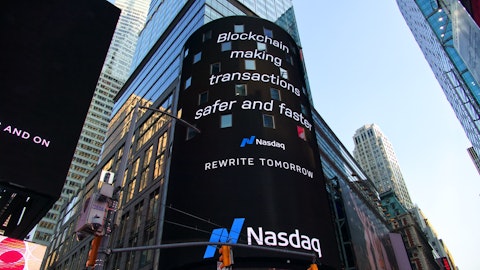We generated net income attributable to KMI of $532 million, down $0.08 from the third quarter of last year. Our earnings per share was $0.24, which is $0.01 down from 2022. Our adjusted earnings was $562 million, down 2% compared to the third quarter of 2022, and our adjusted EPS was flat with last year. Excluding the impact from interest expense, we would have been favorable to last year. And our share count was down $23 million or 1% versus the third quarter of 2022 due to our share repurchase efforts. On our business segment performance, improvements in our natural gas terminals and product segments, which were all up, but were partially offset by lower contributions from our CO2 segment. The favorable natural gas segment performance was driven by greater sales margin on our Texas Intrastate system, favorable rates on recontracting at our Midcontinent Express Pipeline as well as contributions from EPNG and those were partially offset by unfavorable recontracting impacts on our South Texas access.
Our Product pipeline segment was up due to unfavorable pricing impacts in the second quarter of last year as well as rate escalations across multiple assets. Our Terminals segment was up mainly due to improved contributions from our Jones Act tanker business and expansion project contributions. Our CO2 segment was down due to lower CO2 and NGL price and volume as well as higher power costs, and those were all partially offset by contributions from our renewable natural gas business. Our adjusted EBITDA was $1.835 billion for the quarter, up 3% from last year. Our DCF was $1.094 billion, down 2% from last year. And our GCF was $0.49 equal to last year. Again, excluding interest expense, we were favorable to last year. Moving on to our balance sheet.
We ended the third quarter with $30.9 billion of net debt. Our net debt has decreased $9 million since the beginning of the year and on a year-to-date basis, the reconciliation is as follows; we generated $4.7 billion of cash from operations. We’ve paid out $1.9 billion in dividends. We’ve also funded $1.85 billion in total capital expenditures, and that includes growth sustaining and contributions to JVs and settled through the third quarter, we had stock repurchases of $389 million. That gets you pretty close to the $9 million change in net debt year-to-date. And with that, I’ll hand back to Kim.
Kim Dang: And I think, David, on the share count, you mean it was down 23 million shares. Okay. With that, we will take questions. [Operator Instructions]. So operator, Michelle, would you please open it up for questions.
Operator: Thank you. [Operator Instructions] Jeremy Tonet with JPMorgan. You may go ahead, sir.
Jeremy Tonet: Hi, good afternoon.
Kim Dang: Good morning Jeremy.
Jeremy Tonet: Just wanted to start off with a high-level question, if I could. And just coming back to some of the commentaries you said in the past, given that the business has worked through a lot of, I guess, adverse contract rolls and other kind of headwinds are in the past. If you think about the current portfolio, how do you think the EBITDA growth generation is for this asset base? Do you see this as low single-digit EBITDA growth, mid-single-digit EBITDA growth or any other, I guess, framework that you could provide for us would be helpful?
Kim Dang: Sure. So, I think we will go through our 2024 budget in the next month, six weeks or so. I think that will give us a better idea for 2024. But just at a high level, you’re right that we have had some contract rollovers. We published those for you for the last couple of years in our analyst conference. And we stopped doing that because the headwinds with respect to rollovers, et cetera, were not – were no longer material. So, I think the network and natural gas, as you know, the pipes have filled up. Average utilization has gone much higher. That allows you to charge higher rates. That also means that your customers need ancillary services. Storage rates have increased significantly. So, we’re able to charge more for storage.




